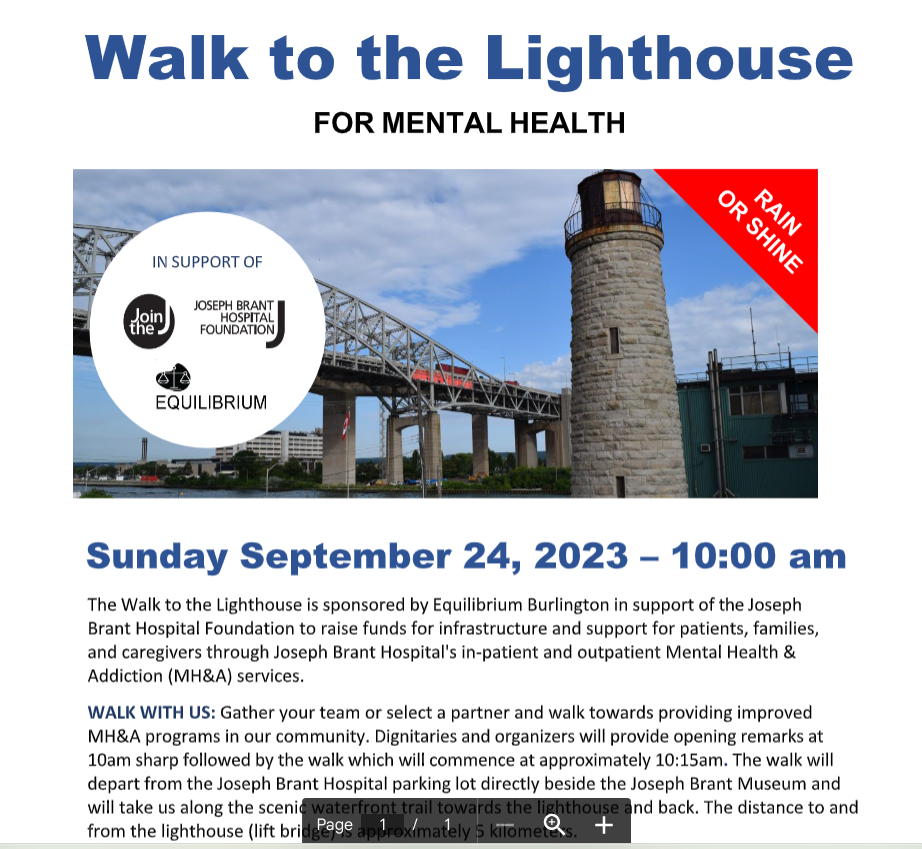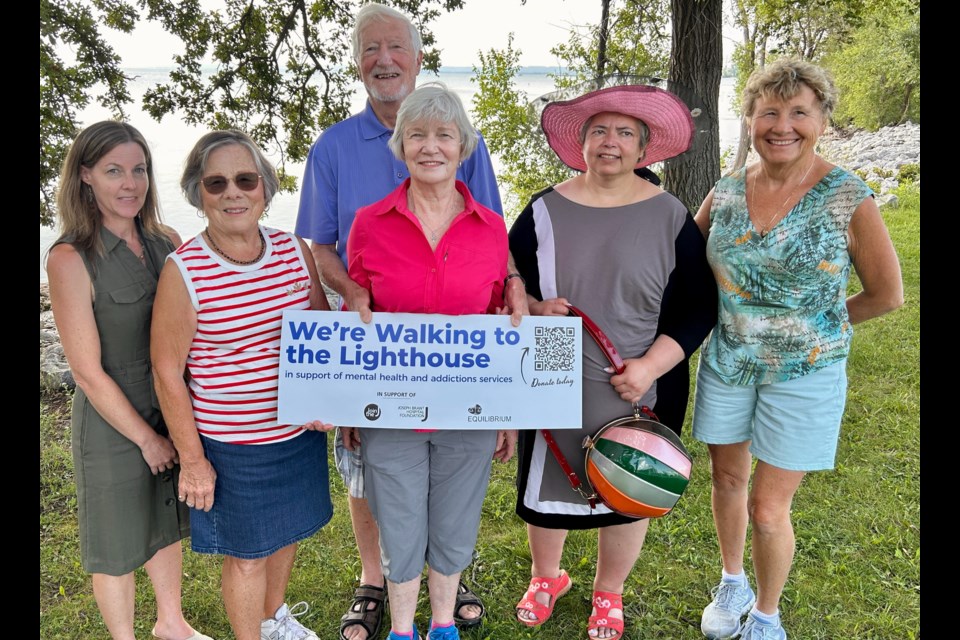Melanie Walker is hoping the community will put one foot in front of the other help support the many mental health resources available at Joseph Brant Hospital (JBH).
The third annual Walk to the Lighthouse in support of mental health takes place Sunday, Sept. 24, at 10 a.m. Walker is the intake coordinator for out-patient mental health at JBH, and she sees firsthand the positive outcome that programs at the Burlington hospital can have. She is part of the Patient Family Advisory Council committee, which organizes the walk.
The Walk to the Lighthouse is sponsored by Equilibrium Burlington, a community-based advocacy and peer support group for individuals, family members and care partners who are affected by mental health and addiction challenges. The event raises funds for infrastructure and support for patients, families and caregivers through JBH's in-patient and outpatient Mental Health and Addiction (MHA) services.
infrastructure and support for patients, families and caregivers through JBH's in-patient and outpatient Mental Health and Addiction (MHA) services.
Teams or partners are invited to walk to help improve MHA programs in Burlington. Opening remarks will kick things off and the walk will begin at 10:15, leaving from the hospital's parking lot beside Joseph Brant Museum.
Participants will walk to the lighthouse and back along the waterfront trail, approximately 5 km. JC's Hot Bagels will provide food for the event, which also aims to build awareness, reduce stigma and build community support and understanding.
Organizers are hoping everyone can join.
“We have no limit. Would love to have too many people,” said Walker, who’s co-chairing the walk. “The lighthouse is a beacon of hope and that’s exactly what it means to patients who are in the JBH unit.
“There was a patient, and for her, the idea of walking to the lighthouse was so meaningful - it got her out and it got her moving…there will be light in the storm and we walk toward the lighthouse for that reason,” added Walker, who’s been working at JBH for more than 20 years.
Last year, they received approximately 5,000 referrals for programs in community mental health; there were approximately 650 in-patient admissions this past year.
Walker said there are many programs for every age level and went on to highlight some of them.
“The PACT team is known as the 'hospital without walls'; they do med drops, observe people taking, daily visits - they do a lot to support the community. We do our very best. We try not to have wait times. And the way we partner with everyone, it’s definitely the whole ‘it takes a village’.”
Additional services include:
- Case management that provides one to two reach-outs each week, working closely with a psychiatrist to manage meds and symptoms
- An injection clinic that helps people who come in and get their medications, and there are nurses who go into the community to do that
- A short-term Dialectical Behaviour Therapy (DBT) program that provides cognitive behavioural therapy that combines things such as mindfulness and acceptance
- A concurrent disorder program for substance abuse and mental health, which brings people in for an assessment with a social worker and connects them with community supports
- A child and adolescent program that treats patients up to age 18; a psychiatrist does the assessment and makes treatment recommendations and the program is supported by social worker and nurse
- The youth intervention program (YEI), which provides help to those 16 to 24, and is meant for people who are new to mental health care or have accessed youth programs and are transitioning to the adult system
- The Psychiatric Emergency Services (PES) program, which helps patients who have come into emergency care
- The Phoenix Early Intervention in Psychosis Program, which serves individuals aged 14-35 years old who are experiencing early signs and symptoms of psychosis
Other specialized programs treat borderline personality disorder, suicidal or self-harm behaviour, and teach people to learn healthy ways to live a life worth living, said Walker.
“We don’t have a lot of staff and yet we service a lot of people through it,” she said, noting there are about 100 staff members. “We have no wait time. We had groups running within three weeks of the pandemic running…multiple groups per week.
“What gets us through is that our services make the difference,” she said of the PACT team. “If you have an online group, and you start with 21 people, you’d end with that - practically no dropouts.”
An example is the Cognitive Behaviour Therapy (CBT), which runs for two hours once a week online and one hour of therapy. “There’s also coaching – you can call me and you tell me, 'I feel like doing this,' and I’ll say, ‘I need you to do this.’ And they do. It’s evidence that online does work.”
There are also consultation programs with a psychiatrist, when people can be assessed and diagnosed. Some may have tried various medications that don’t seem to be working, so they can be referred to see a psychiatrist. “It’s a shared-care model. You get assessed, maybe a few follow ups, and then referred back to the family doctor," explained Walker.
All of the programs will benefit from the Walk to the Lighthouse fundraiser. Last year’s event raised more than $19,000 that was used to enhance JBH mental health and addiction services.
Visit www.equilibriumburlington.com/events to learn more.



